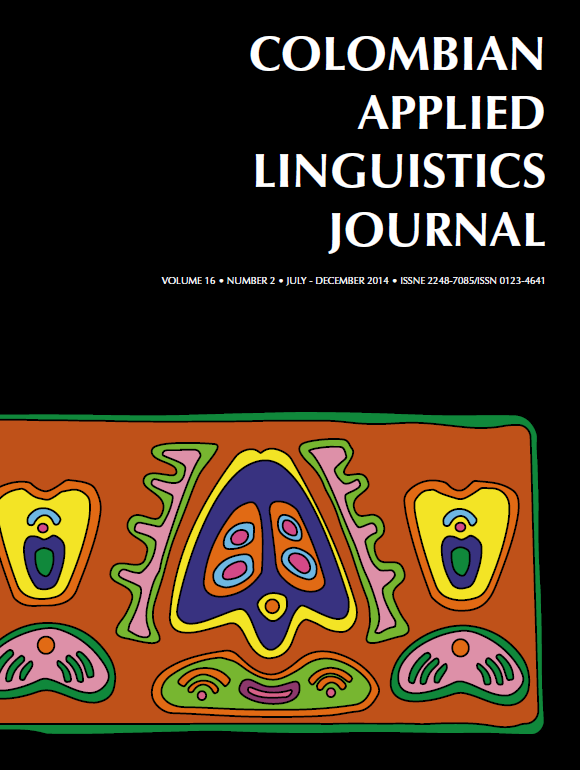DOI:
https://doi.org/10.14483/udistrital.jour.calj.2014.2.a01Publicado:
2014-09-22Número:
Vol 16, No 2 (2014) July-DecemberSección:
Artículos de InvestigaciónRelational teaching: a way to foster EFL learners’ intercultural communicative competence through literary short stories
Enseñanza relacional: una forma de desarrollar la competencia comunicativa intercultural de estudiantes de inglés como lengua extranjera a través de cuentos literario
Palabras clave:
Enseñanza Relacional, competencia comunicativa intercultural, cuentos multiculturales, ILE (inglés como lengua extranjera), temas comunes (es).Palabras clave:
EFL (English as a Foreign Language), intercultural communicative competence, commonalities, multicultural literary texts, Relational Teaching (en).Descargas
Resumen (en)
This article presents an action research study2 in an advanced EFL class of the language program at a public university in Bogotá, Colombia in 2011. The study suggests that the inclusion of authentic multicultural short stories from the U.S. fosters learners’ critical intercultural communicative competence (ICC) through the implementation of the Relational Teaching approach. The collected data demonstrated that learners developed critical intercultural skills through commonalities (a concept proposed by Relational Teaching) when they read literary short stories. Findings show that applying new teaching approaches and literature in EFL might contribute to create critical intercultural awareness.
Resumen (es)
Este artículo describe un estudio de investigación acción realizado en una clase de inglés avanzado perteneciente a un programa de lenguas modernas en una Universidad pública en Bogotá, Colombia en el 2011. El estudio sugiere que la inclusión de cuentos multiculturales de USA en el contexto de inglés como lengua extranjera (ILE) desarrolla la competencia comunicativa intercultural de los estudiantes mediante la implementación del enfoque “Enseñanza Relacional.” Los datos recogidos muestran cómo los estudiantes desarrollaron habilidades interculturales críticas a través de temas comunes o commonalities (un concepto propuesto por la Enseñanza Relacional) cuando leyeron los cuentos literarios. Los hallazgos muestran que la aplicación de nuevos enfoques de enseñanza en el contexto ILE puede contribuir a crear conciencia intercultural crítica.
Referencias
Amer, A. (2003). Teaching EFL/ESL literature. The Reading Matrix, (3).2, 238-245.
Atkinson, D. (1999) TESOL and culture. TESOL Quarterly (33). 4, 625-654.
Banks, J. (2004). Teaching for social justice, diversity, and citizenship in a global world. The Educational Forum 68, 289-298.
Byram, M., A. Nichols, and D. Stevens. ed. (2009). Developing intercultural competence in practice. Exeter, England: Cromwell Press.
Byram, M. (1997). Teaching and assessing intercultural communicative competence. Clevedon: Multilingual Matters.
Cai, M. (2000). Multicultural literature for children and young adults: reflections on critical issues. Westport, CT: Greenwood Press.
Candlin, C., D. Hall, and J. Hall. (2002). Teaching and researching language and culture. Esses, England: Longman.
Carter, R. and J. McRae. Eds. (1996). Language, literature and the learner. London: Longman.
Carter, R. and M. Long. (1991). Teaching literature. London: Longman.
Cisneros, S. (1992). Woman hollering creek. Woman Hollering Creek and Other Stories. New York: Vintage Books, 43-56.
Council of Europe. Common European framework of reference for languages: learning, teaching, assessment, 2001.Web.<http://www.tilgher.it> retrieved: February, 14, 2008.
Freeman, L. (1998). Doing teacher-research: from inquiry to understanding. Heinle & Heinle.
Gregory, Nick. “Shame.” Nigger: An Autobiography. Washington: Washington Square Press Publication,1964.
Hames-Garcia, M. (2003). “Which America is ours?: Marti’s ‘truth’ and the foundation of ‘American literature.’ MFS Modern Fiction Studies. 49.1, 19-53.
Iscoff, E. Crossing the mainstream: multicultural perspectives in teaching literature. Urbana: National Council of Teachers of English, 1994.
Keating, A. Making new connections: Transformational multiculturalism in the classroom. Pedagogy 4.1 (2004): 93-17.
Kramsch, C. (2001). Content and culture in language teaching. Oxford: Oxford University Press.
Lázár, I. (2003). Incorporating intercultural communicative competence in language
teacher education. Council of Europe: European Centre of Modern Languages.
Lorde, A. (1984). Sister outsider. Freedom, Calif.: Crossing Press.
Malamud, B. (1989). The first seven years. Prentice Hall Literature: The American Experience. Englewood Cliffs, NJ: Prentice Hall, 946-953.
McRae, J., (Ed.). (1996). Language, literature and the learner. London: Longman.
Paran, Amos. (2006).The stories of literature and language teaching. En: A. Paran (Ed.), Literature in Language Teaching and Learning (pp.11-26). Washington: Case Studies in TESOL Practice Series.
Parker, Joan. Teaching through Culture: strategies for reading and responding to young adult literature. Houston: University of Texas, Arte Publico Press, 2002.
Patton, M. (2002). Qualitative research and evaluation methods. (3rd edition). California: Sage Publications, Inc.
Sanders, L. A. 2009. Multicultural literature in performance. Evoking shades of deeper meaning. Curriculum and Teaching Dialogue, Vol. 11, No. 1 & 2, 193–205.
Saslow, J. & Ascher, A. (2005). Top Noch: English for today’s world. New York, NY: Pearson, Longman.
Savviduo, C. (2004). An integrating approach to teaching literature in the EFL classroom. The Internet TESL Journal, 10 (12). Available at http://iteslj.org/Techniques/ Savvidou-Literature.html. retrieved: March 28, 2010.
Sihui, M. (1996). Interfacing language and literature: With special reference to the teaching of British cultural studies. In R. Carter & J. McRae (Eds.), Language literature and the learner: Creative classroom practice. London: Longman, 166-184.
Stake, R. (2010). Qualitative research: studying how things work. New York: The Guilford Press.
Varga-Dobai, K. and Wilson, A. (2008). Children’s literature and literacy: diversity and transformation. Journal of Language and Literacy Education 4.2, 1-5. Available at: http://www.coe.uga.edu.proxy.lib.ilstu.edu/jolle/index.html. Retrieved: May 22, 2009.
Zafeiriadou, Nelly. (2011). On literature in the EFL classroom. Developing Teachers.com:
A Website for the Developing Language Teacher, 1-4. Available at:
http://www.alsaha.co.il/vb/showthread.php?t=10073. Retrieved: October 6, 2011.
Cómo citar
APA
ACM
ACS
ABNT
Chicago
Harvard
IEEE
MLA
Turabian
Vancouver
Descargar cita
Métricas
Licencia
Esta publicación tiene licencia de Creative Commons Reconocimiento-No comercial- Sin obras derivadas 2.5 Colombia. El lector podrá leer, copiar y distribuir los contenidos de esta publicación bajo los términos legales de Creative Commons, Colombia.
Para mayor información referirse a http://creativecommons.org/licenses/by-nc-nd/2.5/co/








